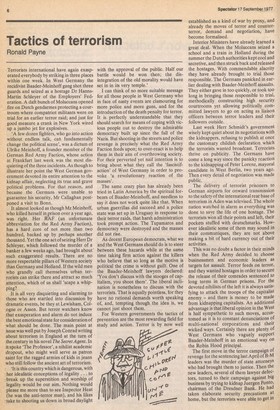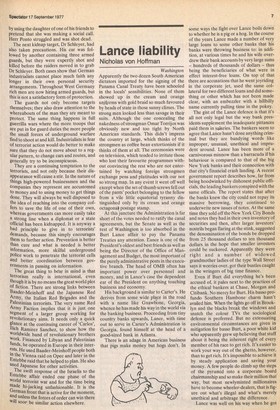Tactics of terrorism
Ronald Payne
Terrorists international have again exasperated everybody by striking in three places within one week. In West Germany the recidivist Baader-Meinhoff gang shot three guards and seized as a hostage Dr Hanns Martin Schleyer of the Employers' Fed eration. A daft bunch of Moluccans opened fire on Dutch gendarmes protecting a cour troom where compatriot militants were on trial for an earlier terror raid; and just for good measure a crank in New York wired up a jumbo jet for explosives.
'A few dozen fighters, who go into action without endless talk, can fundamentally change the political scene', was a dictum of Ulrike Meinhoff, a founder member of the German Red Army Faction, whose action at Frankfurt last week was the most dis quieting of the three incidents. As though to illustrate her point the West German gov ernment devoted its entire attention to the kidnap affair, neglecting its true and grave political problems. For that reason, and because the Germans were unable to guarantee his security, Mr Callaghan postponed a visit to Bonn.
It almost looked as though Mz Meinhoff, who killed herself in prison over a year ago, was right. Her RAF (an unfortunate abbreviation for the Red Army Faction), has a hard core of not more than two hundred, backed up by perhaps another thousand. Yet the one act of seizing Herr Dr Schleyer, which followed the murder of a banker a few weeks ago, had brought about' such exaggerated results. There are no more respectable pillars of Western society than Germany and Holland. If the wild men who grandly call themselves urban terrorists can strike there and attract so much attention, which of us shall 'scape a whipping?
It is all very disquieting and alarming to those who are startled into discussion by dramatic events, be they at Lewisham, Col ogne or Assen. But terror watchers know that exasperation and alarm do not induce the best emotional state for consideration of what should be done. The main point at issue was well put by Joseph Conrad writing about terrorism in England at the turn of the century in his novel The Secret Agent. In it spoke 'The Professor', a nihilist academic dropout, who might well serve as patron saint for the ragged armies of kids in jeans who still follow the ancient art of terrorism.
'It is this country which is dangerous, with her idealistic conceptions of legality . . . to • break up the superstition and worship of • legality would be our aim. Nothing would please me more than to see Inspector Heat (he was the anti-terror man), and his likes take to shooting us down in broad daylight with the approval of the public. Half our battle would be won then; the disintegration of the old morality would have set in in its very temple.'
I can think of no more suitable message for all those people in West Germany who in face of nasty events are clamouring for more police and more guns, and for the introduction of the death penalty for terror.
It is perfectly understandable that they should search for means of coping with vicious people out to destroy the admirable democracy built up since the fall of the Nazis. But shooting in the streets and police revenge is precisely what the Red Army Faction feeds upon; to over-react is to help them in their aim of overthrowing society. For their perverted yet nail intention is to bring about what they call the lascistifaction' of West Germany in order to provoke 'a revolutionary reaction of the masses'.
The same crazy plan has already been tried in Latin America by the spiritual for bears of Baader-Meinhoff, and needless to say it does not work quite like that. When urban guerrillas did succeed and a police state was set up in Uruguay in response to their terror raids, that harsh administration took prompt action. The Tupamaros and democracy were destroyed and the masses did not rise.
As decent European democrats, what we and the West Germans should do is to steer between these hazards while at the same time taking firm action against the killers who believe that so long as the motive is political the crime is without guilt. One of the Baader-Meinhoff lawyers declared: 'You don't discuss with the stooges of cap italism, you shoot them'. The liberal inclination is nonetheless to discuss with the terrorists. That is equally pointless, for they have no rational demands worth speaking of, and, tempting though the idea is, we cannot just shoot them.
For Western governments the tactics of prevention are the most rewarding field for study and action. Terror is by now well established as a kind of war by proxy, and already the moves of terror and counterterror, demand and negotiation, have become formalised.
Interior Ministers have already learned a great deal. When the Moluccans seized a school and a train in Holland during the summer the Dutch authorities kept cool and secretive, and then struck back and released the hostages. With commendable alacrity they have already brought to trial those responsible. The Germans panicked in earlier dealing with Baader-Meinhoff assaults. They either gave in too quickly, or took too long in bringing those responsible to trial, methodically constructing high security courtrooms yet allowing politically committed lawyers to go on acting as liaison officers between terror leaders and their followers outside.
Last week Herr Schmidt's government wisely kept quiet about its negotiations with the kidnappers, refusing to publish at once the customary childish declaration which the terrorists wanted broadcast. Terrorists thrive on publicity. The Germans have come a long way since the panicky reaction to the kidnapping of Peter Lorenz, mayoral candidate in West Berlin, two years ago. Then every detail of negotiation was made public.
The delivery of terrorist prisoners to German airports for onward transmission to the safety of the international rear base of terrorism in Aden was televised. The whole nation watched in alarm as everything was done to save the life of one hostage. The terrorists Won all their points and left, their pockets stuffed with deutschmarks. However idealistic some of them may sound in their communiques, they are not above making a bit of hard currency out of their activities.
This was no doubt a factor in their minds when the Red Army decided to choose businessmen and economic leaders as targets for assault. Terror feeds on terror, and they wanted hostages in order to secure the release of their comrades sentenced to long terms in German prisons. For the devoted nihilists of the left it is always satisfying to attack the troops of the capitalist enemy — and there is money to be made from kidnapping capitalists. An additional advantage is that liberal opinion in the West is half sympathetic to such moves, accustomed as it is to constant denunciations of multi-national corporations and their wicked ways. Certainly there are plenty of West Germans who vaguely support Baader-Meinhoff in an emotional way on the Robin Hood principal. The first move in the terror campaign of revenge for the sentencing last April of B-M leaders was the murder of state attorneys who had brought them to justice. Then the new leaders, several of them lawyer defec tors, turned to their campaign against big business by trying to kidnap Juergen Ponto, chairman of the Dresdner Bank. He had taken elaborate security precautions at home, but the terrorists were able to get in by using the daughter of one of his friends to pretend that she was making a social call. Herr Ponto struggled and was shot dead.
The next kidnap target, Dr Schleyer, had also taken precautions. His car was followed by another containing three armed guards, but they were expertly shot and killed before the raiders moved in to grab Dr Schleyer. Both cases show that German industrialists cannot place much faith any longer in their own personal security arrangements. Throughout West Germany rich men are now hiring armed guards, but this is not a satisfactory form of protection.
The guards not only become targets themselves; they also draw attention to the whereabouts of the man they are meant to Protect. The same thing happens in full guerrilla wars where the more troops that are put in for guard duties the more people the small forces of underground warfare find to shoot at and kill. Industrialists in fear of terrorist action would do better to make sure that they do not move about to a regular pattern, to change cars and routes, and generally try to be inconspicuous. They are a continuing temptation to the terrorists, and not only because their disappearance will cause a stir. In the nature of things high-powered businessmen and the Companies they represent are accustomed to money and to using money to get things done. They will always be well disposed to the idea of reaching into the company coffers to save the life of one of their own, whereas governments can more easily take a strong line when a diplomat or a state Official has been kidnapped. It is anyway a bad principle to give in to terrorists' demands, because this simply encourages them to further action. Prevention is better than cure and what is needed is better Information, more skilful underground Police work to penetrate the terrorist cells and better coordination between governments in passing on information. The great thing to bear in mind is that terrorism really is international, even though it is by no means the great world plot of fiction. There are strong links between Baader-Meinhoff and the Japanese Red Army, the Italian Red Brigades and the Palestinian terrorists. The very name Red Army Faction implies that it is just one segment of a larger group working for revolutionary aims. It needs only a quick glance at the continuing career of 'Carlos', Rich Ramirez Sanchez, to show how the worldwide band of revolutionary brothers Work. Financed by Libyan and Palestinian funds, he operated in Europe in their interests. He used Baader-Meinhoff people both in the Vienna raid on Opec and later in the Entebbe raid that he helped to plan. He also used Japanese for other activities. The swift response of the Israelis to the Entebbe affair ended one phase of the world terrorist war and for the time being made hi-jacking unfashionable. It is the German front that is active for the moment, and unless the forces of order can win there will soor be similar action elsewhere.































 Previous page
Previous page